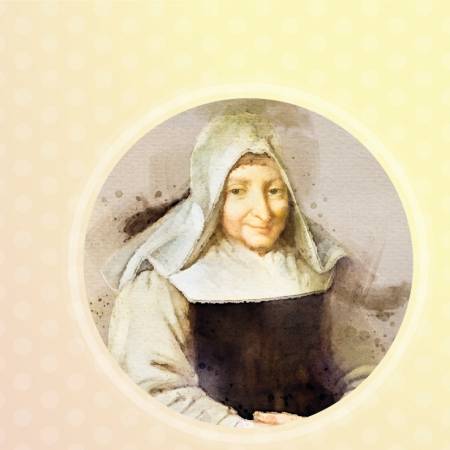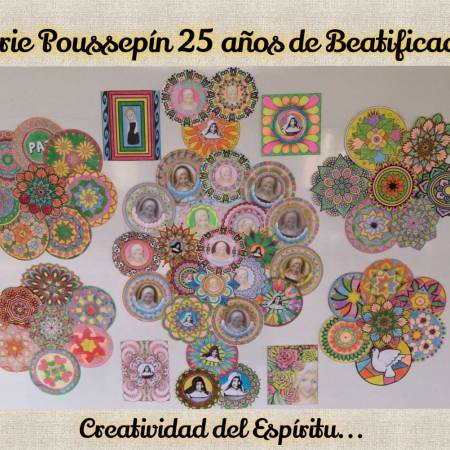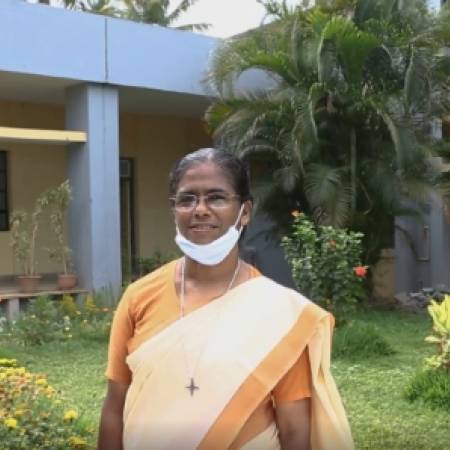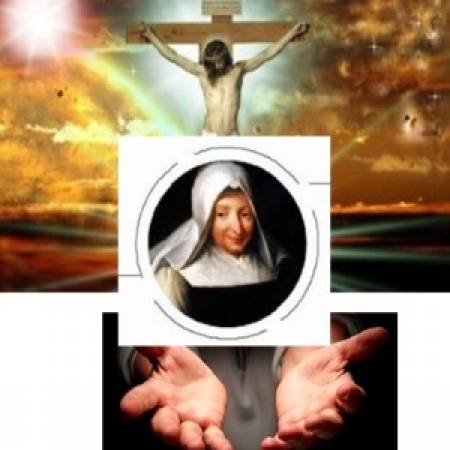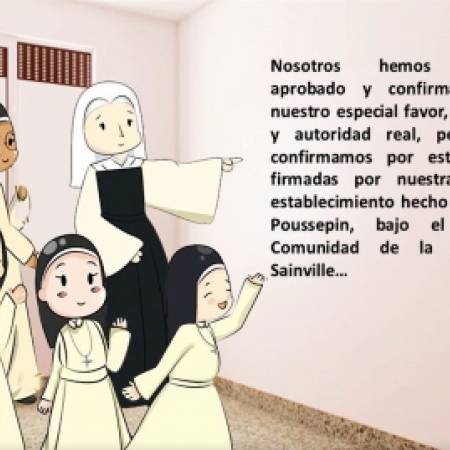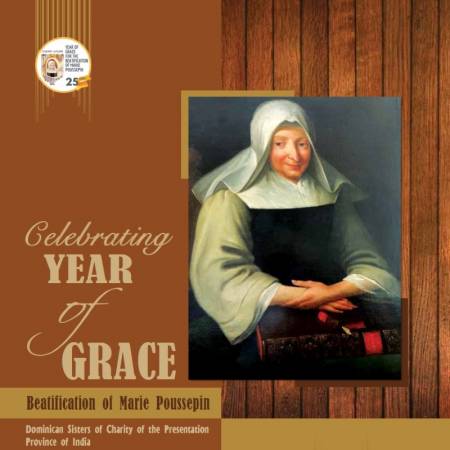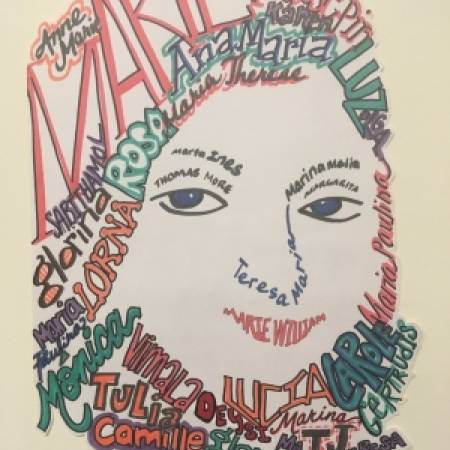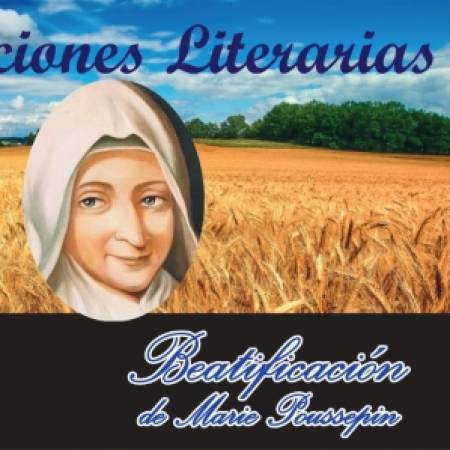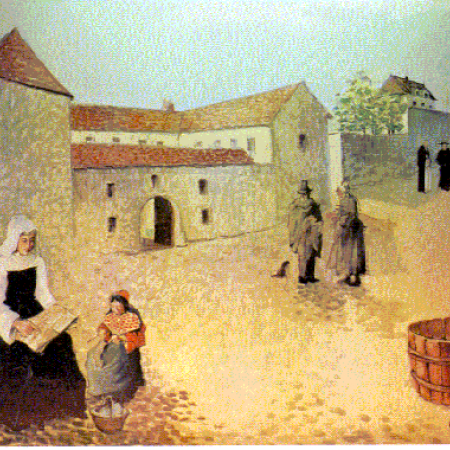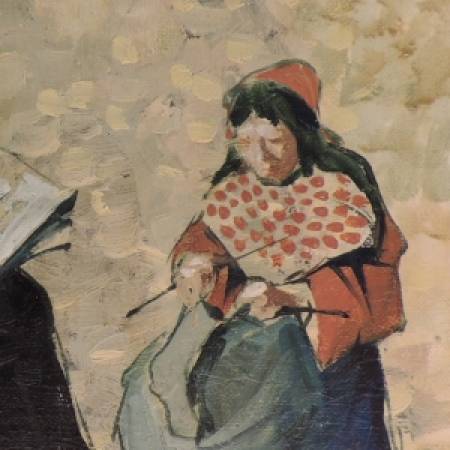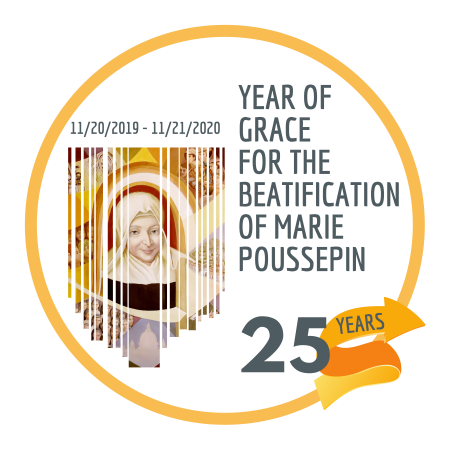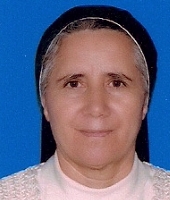DOWNLOAD IN PDF:
By SR. OLGA MARÍA BOTIA SÁNCHEZ* (COLOMBIA).- “As I have already disposed of all that I owned, not keeping anything for myself, I have nothing”, Marie Poussepin, Testament.
“We search for justice in solidarity with the poorest,
With them, we fight misery, ignorance and disease
down to their very roots,
in order to live the Gospel with them.” C 27
During this Year of Grace for the 25 Years of the Beatification of Our Mother Foundress, the proposal from the General Government to reflect on the theme: “Social Justice, Nonviolence and Peace” is a challenge and also an opportunity to study in depth the Life and Charism of a fascinating woman whom, since my first contact with the Congregation, I admire, identify myself with, and try to make known through my mission in a simple way. The importance given for the work of Justice and Peace, is based on the account of Luke 4:18 about the great mission that Jesus proclaimed in the Synagogue of Nazareth: “The Spirit of the Lord is upon me, because he has anointed me to bring glad tidings to the poor. He has sent me to proclaim liberty to captives and recovery of sight to the blind, to let the oppressed go free, and to proclaim a year acceptable to the Lord.”
Jesus takes a prophetic stance. He goes back to the text from Isiah, applies it to himself, making it the basis of his project for the Kingdom of truth, love, justice and peace.
The Documents of the church indicate that from the theological point of view, justice is the fruit of the Spirit and finds its basis in love. The Spirit is love: Where there is love, there is justice and justice can’t make it without love. Love, “the fundamental law for human perfection and therefore, for the transformation of the world,” is not only the supreme commandment of the Lord, but also the drive that must move the Christians to bring about justice in the world, with truth as its basis and freedom as its sign.”
“Justice considered as a special virtue distinct from other moral virtues is defined as: A firm and constant will to give to each one what is due to that person. Considering her relationship with God and her relationship with the neighbor, there is no doubt that Marie Poussepin practiced it perfectly, because from her very tender age on, she manifested a profound respect for God and was projecting it through love and service of charity.
She always showed herself to be concerned about fulfilling her duties of religion with regard to God by obeying his precepts and rendering him the homage due to his Divine Majesty.”
To look at our Mother Foundress from the perspective of Justice, Nonviolence and Peace means to see her as an upright person inspired by God’s Law, who acts according to His will, following the example of Jesus. She reveals this experience to us in the Rule of Sainville and transmits it to us as her Charism.
In her reflection on this theme, Sr. Mary Plata Cordero said: “we do not find in her writings a theoretical explanation of what justice is, nor an enumeration of the duties that this virtue entails, but the facts of her life as daughter, sister, the person responsible for the workshop, foundress and superior do speak to us.”
Marie Poussepin was immersed during her childhood and youth in the Christian atmosphere of her family home which was devoted to the poor of the Confraternity of Charity and was in direct contact with the sick. She learned justice at home, let herself be challenged by the suffering and vulnerable people around her and did not hesitate to take “the step from Dourdan to Sainville,” The financial security that characterized her family did not make her indifferent to the needs of her neighbor. Motivated by the spirit of Saint Vincent de Paul and the love of Jesus Christ, the “Lord of Charity,” she practiced this divine virtue in a very natural way. “From 1675 to 1691 she was attentive to her responsibilities in the Confraternity of Charity, to the management of her family home and the good success of the transformations of her business without any loss. We see it also in the many functions she had to assume in the running of her community of Sainville” .
With a sense of social justice, being coherent with her desire to help the poorest of her time, she chose to start her work not in a prosperous city, but in Sainville, a simple town where misery was great.”
With a practical intelligence, she knew how to do good and provide tools and resources for the young girls in the countryside and assure their wellbeing. She prepared them to practice charity wherever they were sent. “To follow Jesus Christ according to the Charism means to live an incarnated spirituality which leads us to consider reality as a place of manifestation of and encounter with God, to develop a contemplative attitude capable of listening to his voice in concrete life, and to discover his face in each person, especially in those who are the most disadvantaged.”
Her justice radiates in the recommendations of the Rule of Sainville which she practiced with her sisters for 40 years before they were presented to be approved and also in the orders and advices that she gives to the sisters.
She exhorts the teaching sisters not to dedicate themselves less to the poor girls than to the rich, as they are motivated by love, the supernatural virtue of charity and are giving them the example of God himself. “The sisters who are employed in the schools will remember that they are obliged to fulfill their duty in regards to the instruction and teaching of youth, not only for charitable reasons, but also out of justice.”
To the sisters who are nurses: “Serve the sick with great charity, and without showing any sign of distaste, Try, if possible, to be even more useful to the good of their souls than to the relief of their bodies. The sisters will include spiritual assistance to the bodily care given to the sick.” “The nurse should be charitable, and her charity should extend to all the Sisters, without exception...”
Marie Poussepin really practiced the virtue of justice in a heroic way, with regard to God, His Church, her parents and her sisters; in a word she practiced it towards all.
For Marie Poussepin, Social justice means to act with transparency in the presence of God, do always good and live the demands of daily life, by letting oneself be overcome by Him.
The Sacred Scripture tells us that: “She reaches out her hands to the poor, and extends her arms to the needy.”
In our Foundress, we can find this perfect woman, full of compassion, who “saw what was right in the eyes of God and accomplished it.” Her merciful heart motivated her to take a social initiative, very adventurous in her time and she traced a new path for woman religious of her time. She embraced the spirituality and life style of Saint Dominic and proposed a new style of Community, faithful to the traditions of the Order of Preachers and open to new needs. “Her community has a very precise purpose: “for the utility of the parish, to instruct the youth and serve the sick poor of the parish of Sainville.”
For Marie Poussepin, work in the sense of Justice , is an aspect of human promotion at the Service of Charity; work permits us to respond to the needs of the community and apostolate; “she has enough trust in Providence to be certain that the sisters will not be wanting for the necessities of life, as long as they will be faithful to their Rule, and diligent at work.”
Back in Dourdan, undoubtedly there is a “human promotion that is restricted: by historical causes and circumstances such as the industrial revolution, ideological influences such as liberalism on free trade, social changes such as the transition from the feudal era to the modern era, charitable orientation as a result of the labor innovation of her factory in favor of the workers and especially, the Young apprentices.”
From the fabrication of stockings in Dourdan to the making of stockings in the workshop of Sainville we can observe the importance that Marie Poussepin gives for work. , and asks us with insistence “to be assiduous in work”, which is a “place of encounter with our brothers and sisters, an intercultural dialogue. It permits us to assure our subsistence, the service of charity, solidarity and gratuitousness.”
Inspired by her Charism of service, she enters the world of human suffering with audacity and mercy to impregnate it with life, by a continuous exercise of Charity.
“Marie Poussepin reminds us primarily of the importance of contemplative life and prayer which forms a man or a woman to be passionately in love with God and enables them to be passionately in love with their brothers and sisters.”
The Documents of the Congregation recognize our presence in places where violence, migration, displacement and epidemics create so much misery. They exhort us to continue with audacity and creativity, following the example of Our Foundress, to respond to these new ‘Sainvilles’ where ignorance and powerlessness of so many brothers and sisters demand our solidarity.
Which is the Sainville that challenges me and demands me to leave the Dourdan where I am living at present?
“Happy are those who work for peace,
because they will be called sons of God” (Mathew 5:9)
Happy are you because you founded a community for the service of the Church, with very poor orphan girls from the countryside.
Happy are you because you spoke to us about mutual forgiveness and loving correction.
Following the example of its Foundress, the Congregation has been at the service of peace and justice. Since peace is always in danger and the harmony between people seems to be destroyed, it has looked for ways to participate in the construction of justice and peace as an ongoing commitment.
The General Chapter of 1999 tells us in a very explicit way:
“The defense of human rights and the option for “JUSTICE and PEACE” are essential elements of our consecration and of our mission in Dominican life.”
“We want to respond to our societies marked by violence, poverty, injustice and illness.
Specifies some of the requirements:
• Openness to conversion, formation and risk.
• Solidarity with the weakest.
• Adequately use the means of social communications” .
The General Chapter of 2014 invites us to:
Reinforce our missionary presence in the “peripheries”;
Take on and give a new impetus to questions about Justice and Peace, commitment for life, formation in bioethics, and attention to questions about the environment.
Give priority to our missionary choices in the existential or geographic peripheries: “There where life clamors.”
The General Chapter of 2019 indicates:
“The reality of the world and the Church with its lights and shadows, cries out every day through new faces, new needs and new urgencies and moves us to new scenarios of mission. The great challenge is to respond with our life and our actions whatever can be done to restore human dignity, denouncing any abuse that threatens life, with obvious actions of justice and peace, defending life and caring for our common home.”
The celebration of this Year of Grace for the 25 years of the Beatification of Marie Poussepin, as “Social Apostle of Charity,” at this time of uncertainty caused by the Coronavirus pandemic which has imposed on us a lifestyle with “lockdown,” is the “favorable time” in which we can experience the presence of God in our lives and ask ourselves some questions:
What would Marie Poussepin do in my place?
What concrete gestures of Justice and Peace, are we called to make?
Jesus gives us his Peace; let us allow Him to dwell in us. We feel that He is in our local communities, because these are the “homes and schools of communion,” spaces of dialogue where we grow in fraternal love and where we dream and discern so that our “project of evangelical life is founded on justice.”
During this year of Grace, with the guidance of the Holy Spirit, may we renew our commitment to let peace grow in our local communities with gestures and words and take up the challenge to live justice in our everyday life.
*Sr. Olga María Botía Sánchez is a sister from the Province of Santafé, Colombia. She offered her services in Chile for 25 years and she returned to Colombia12 years ago. She is involved in social ministry and presently she is coordinator for justice and peace in the Province and she collaborates with the commission for health and security.
BIBLIOGRAPHY
• Marie Poussepin: General Rules; The Rule of Sainville; Letters of Marie Poussepin.
• Preteseille, Bernard. “Marie Poussepin or the exercise of Charity”
• Constitutions. Original Vision.
• Positio
• Marie Poussepin and her Community. The service of Authority. Tours 1996
• General Chapter Documents: 1999; 2004; 2009; 2014; 2019.
• Enlarged General Council Document, 1998.
• Sr. Mary Plata Cordero. “Reflexiones sobre algunas dimensiones del carisma”. 2003
• Sr. Fanny Yolanda Barrantes. Mensaje de Apertura encuentro Interprovincial de delegadas de Justicia y Paz. Provincia de Bogotá. 2017
• Oñoro Consuegra, P. Fidel. “Reflexión sobre las Bienaventuranzas. En brazos del Padre”.
• celam.org/documentoconclusivo_Medellin. Pág. 4
• celam.org/documentoconclusivo_ puebla. Pág. 8
• John Paul II. Apostolic letter Novo Millennio Ineunte. 2001. N° 43


 EN
EN  ES
ES  FR
FR 





